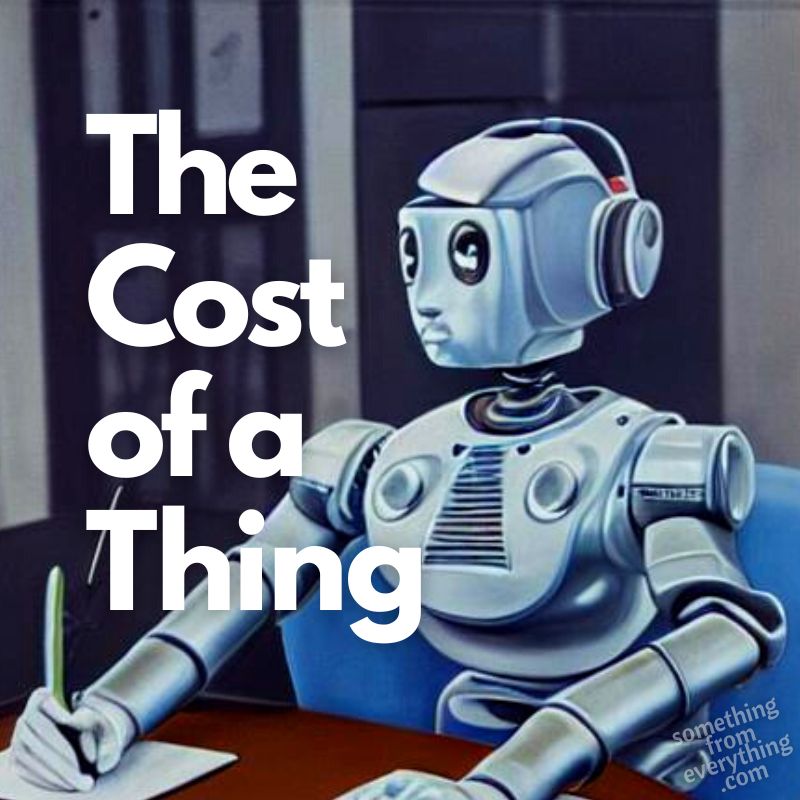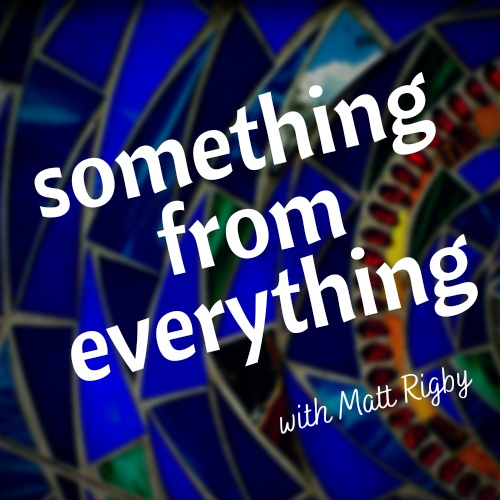
The ad stares up at me, accusing.
I don’t even remember pulling the phone out of my pocket, or clicking on the app. But I know what I was doing the moment before. I had just stepped away from the desk, away from the computer, and away from (yet another) half-written, half-baked, soon to be abandoned post. Writer’s block had reared its hideous head. It looked less like a blank screen, and more like a thousand false starts. Like a loss of conviction.
I had turned towards my favorite distraction, an online marketplace, mindlessly mining the dopamine rich combination of shopping and unpredictable rewards, and avoiding advertisements which seem to occupy more and more of my screen. But this ad was effective, stopping my thumb mid swipe:
“Hate writing blog posts?” it asked.
“No!… I just…its just… it’s been a while”. The defensive response in my mind trailed off.
I read on.
The advertisement was for automated blog posts, generated by artificial intelligence. If I wish, an exchange could be arranged. I part with some money, some key words, general direction and desired tone, and the AI chat bot will make a post that is intelligible, the exact length I desire, and is even laden with my favorite phrases. If the program is intelligent enough, and I give it enough raw data to work with, the program may even sound… just like me.
Anxiety over content creation could be a thing of the past. No more half written posts, no more writer’s block. Pure productivity.
Or so the advertisers promise my soul.
There is truth to that promise of productivity. The number of AI created or assisted projects in this world are increasing drastically, and set to explode exponentially.
You are no doubt familiar with the widespread breakthroughs of artificial intelligence programs in recent months. Images created on programs such as DALL-E 2 and Stable Diffusion are widely shared on Discord, Facebook and Instagram. Open AI chat programs such as Chat GPT and Bard AI are answering questions and completing requested tasks in natural sounding language. Already these most complex AI programs are remarkably accessible, but soon they will be even more so, integrated fully into the world’s largest search engines.
There is a lot of discussion, sound reasoning and wild conjecture about the near future that is being shaped by AI right now. But one thing is undeniably true: the toothpaste is well and truly out of the tube. We’re not going back. We can’t. In addition to the widespread AI created images on social media, AI art is being utilized in film, architecture, and fashion. As I’m writing this, Chat GPT is credited as co-author to over 200 books listed on Kindle. AI narration is being promoted by Apple Books, set to create instant audiobook equivalents for each written work uploaded. Soon, it will be impossible for high school teachers and university professors alike to discern what papers are written “the old fashioned way” rather than AI assisted (or even wholly composed).
This is perhaps where AI programs are poised to be most utilized: those banal and everyday projects we’d rather not labor at. That program that transcribes workplace meetings and then turns that transcription into meeting minutes and lists actionable items. That school essay on the merits and drawbacks of such and such. An AI narrated audiobook in a distinct vocal tone rather than hours spent in front of a microphone. Even an easily compiled blog post, for when you hate writing blog posts.
But do I?
Do I hate the reality of writers’ block? The hours spent trying to write something meaningful without success? Deleting pages of previous written material when you come to the unsettling conclusion that it’s just not good enough? Yeah, I hate that.
Does the student hate the hours researching and note-taking, the hard work of understanding themes and synthesizing data? I know I have.
Does the author hate all the hours spent reading aloud material they’ve already picked over and edited a hundred times, only to find a new turn of phrase that sounds forced or awkward? I’m certain they must.
But I’m not ready to automate these tasks, either.
It’s probably important to note that I’m not a technophobe. I am writing this post on a computer after all, not typing on a typewriter or scribbling the letter forms by hand. And I appreciate that if I wanted to record by dictation and transcription, it would make me no less an author.
Advances in technology and automation always disrupts, always displaces, and also creates new, unforeseen possibilities. I can hardly imagine how many brilliant creations will come forth from people who have never felt talented enough to write a song, paint a picture, or craft a story. I am as entertained as anyone at the bizarre and beautiful visual creations being created and shared. I am both fascinated and unnerved by how human sounding AI created essays can be. Along with the (very real) fear of job losses and downsizing, is a potential increase in workplace productivity that I don’t think even the most forward thinking of us can adequately get our head around.
If these tools are enabling and amplifying the work we want to do, then we should all raise a glass in celebration. The world needs more imagination, more stories, more art. But if these tools are used primarily for outsourcing and automating our lives, we should consider what the true personal cost might be.
As Henry David Thoreau so accurately perceived, “the cost of a thing is the amount of what I will call life which is required to be exchanged for it, immediately or in the long run”. The ‘long run’ is the caveat here. The immediate exchange is incredibly appealing: decreased effort for increased efficiency and productivity. The longer exchange is much more hidden.
There is so much life buried in the mundane, monotonous or (even) despised elements of our work and play. Consider the way that seemingly unrelated and independent pieces of information can give way to larger themes when studying. When listening to recorded audio, we can hear the difference between words that are merely read aloud, and the almost tangible sense that the orator is creating and safeguarding a sacred, shared space for the listener. Our greatest artist’s illustrations always reveal something of themselves, not only the scene they are trying to produce.
What’s being undervalued in these discussions is process. An outsourced, automated, quicker process may be the aim of companies and their advertisers, but the individual may want to consider the value of process.
I know that each time I sit down to create a thing, it never reveals itself all at once. I don’t know how an AI program would help me with this, as much as it irritates and perplexes me. I know the way a good question stays with me, gnaws at my awareness. Like I’m trying to complete a second hand jigsaw puzzle that I’m not even sure I have all the pieces to. But I also know that frustration and curiosity are strange bedfellows, and that I pay more attention when I can feel that I’m missing something. And I also know the pure joy of discovery; that moment of clairity when you uncover what has been hiding in plain sight the whole time.
So, no. I appreciate the offer, but I won’t be outsourcing even the most infuriating aspects of my writing, or my life.
I recognize that I could have created hundreds of generated essays in the span of writing this one. And I don’t doubt that those essays would have been entirely readable, maybe even humorous, intelligent and wise. And that my productivity could be so much greater.
But it wouldn’t be worth the cost. Not in the long run.

Leave a Reply